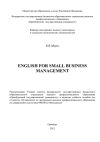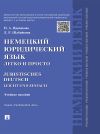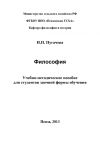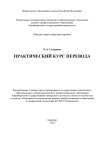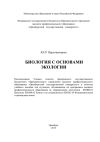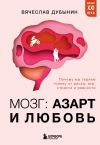Читать книгу "English for academic and scientific purpose"

Автор книги: Татьяна Нечаева
Жанр: Учебная литература, Детские книги
сообщить о неприемлемом содержимом
Г. А. Краснощекова, Т. А. Нечаева
English for academic and scientific purposes
Предисловие
Учебное пособие “ENGLISH FOR ACADEMIC AND SCIENTIFIC PURPOSES” предназначено для магистрантов всех специальностей в качестве базового учебного материала. Пособие может быть также использовано широким кругом лиц с различным уровнем владения языком для совершенствования иноязычной профессионально-ориентированной коммуникативной компетенции.
Ключевые моменты
♦ в пособии представлены тексты по актуальным темам и проблемам;
♦ тексты аутентичны, взяты из оригинальных изданий, релевантны;
♦ работа с пособием дает возможность развивать и совершенствовать коммуникативную компетенцию, которая необходима специалистам, использующих английский язык в профессиональных целях;
♦ использование данного пособия способствует развитию межличностных отношений, т.к. упражнения направлены на общение и взаимодействие (Questions on the text. Discussion Points);
♦ использование пособия обеспечивает самовыражение обучающихся в устной и письменной речи на английском языке.
Содержание и подход
Пособие состоит из самостоятельных разделов (Units), в которых представлены тексты, а также упражнения различной сложности и направленности.
Структура разделов (Units)
Для обеспечения успешного использования данного учебного пособия, а также для улучшения ориентации магистрантов в учебном материале, все разделы (Units) имеют единую структуру.
Тексты (Texts)
В каждом разделе (Unit) представлен аутентичный текст, который предваряется пред – текстовыми и после – текстовыми упражнениями. Базовые тексты (A, B) представлены описательным текстом, тематически связаны друг с другом, но касаются различных сторон темы или расширяют ее.
Упражнения (Exercises)
Упражнения направлены на контроль понимания текстов, совершенствование лингвистической компетенции
Лексика (Words)
Лексика закрепляются в различных языковых и коммуникативных упражнениях (matching, definitions, synonyms, word-building, translation).
Итог (Discussion Points)
В конце каждого раздела (Unit) предлагается перечень коммуникативных заданий для обсуждения проблем в группе и подготовки презентации.
Словарь (Vocabulary)
В вокабуляр включены все активные слова в алфавитном порядке. В этом разделе представлены слова и сочетания, которые носят тематический характер.
Материалы для дополнительного чтения (Supplementary Reading)
В данном разделе представлены аутентичные тексты, дающие дополнительную информацию. Тексты этого раздела рекомендуется использовать при выполнении упражнений (Answer the Questions), а также при итоговом обсуждении текстов каждого раздела (Discussion Points).
Важной составной частью учебного пособия является раздел, связанный с элементами Academic writing. Умение писать и анализировать научные тексты является центральным по отношению к остальным исследовательским компетенциям. Практика написания емкого и убедительного научного текста начинается с первых студенческих работ и не заканчивается никогда, поэтому учебное пособие может быть полезным как магистрантам, пишущим свое первое эссе, так и специалистам, пишущим научную статью. Построение учебного пособия позволяет использовать его как последовательно, так и выборочно для решения конкретных проблем.
Принципы академического письма лежат в основе международной научной коммуникации. А поскольку международная научная коммуникация неразрывно связана с публикацией текстов, то эти принципы определяют требования, предъявляемые как к университетским эссе, так и к статьям в зарубежных рецензируемых научных журналах.
Умение писать научные тексты развивается и совершенствуется на протяжении всей жизни. Академическое письмо представляет собой сложный и многоплановый комплекс умений. Этот комплекс умений включает в себя не только лингвистические (языковые, синтаксические и стилистические), но прежде всего металингвистические компетенции, такие как логика, анализ, критическое мышление, объективность и уважение к иным идеям и чужим текстам. Именно этих умений зачастую не хватает нашим студентам и молодым специалистам.
Академическое письмо и его более высокая ступень, называемая в США «риторикой и композицией», представляет собой научную дисциплину, которая помогает преподавателям всех остальных дисциплин развивать у студентов способность генерировать собственные мысли и выстраивать собственную аргументацию, организуя все это в предельно точной и ясной текстовой форме.
При работе с пособием преподаватель сам может определить конкретные методические приемы в зависимости от уровня подготовки магистрантов и целей обучения. Разделы могут изучаться в представленной последовательности или выборочно. Тематика и характер текстов и заданий пособия обеспечивают формирование у магистрантов умений и навыков профессионального общения.
Unit 1. Mind and Brain
Lead-in:
A computer required hardware to perform its function. In addition, the hardware need software to make it run. Without software, hardware would be useless and without hardware, software cannot be used. Brain is like the hardware and mind is like the software. However, in reality, the difference between brain and mind are more complicated than software and hardware.
In our culture, we sometimes use the words brain and mind interchangeably even though they really do refer to separate, although often overlapping, concepts. The brain is an organ but the mind is not. The brain is the physical place where the mind resides. The electronic impulses that create thought are contained in a vessel. With the brain, you coordinate your moves, your organism, and your activities and transmit impulses. However, you use the mind to think. You can muse at what happened, what is scheduled and what maybe will happen.
The mind is the manifestations of thought, perception, emotion, determination, memory and imagination that takes place within the brain. Mind is often used to refer especially to the thought processes of reason. (1)
Pronunciation:
Task 1
Memorize the pronunciation of the following words.
retrieve [ rɪˈtriːv ]
reshuffle[ riːʃʌflˌ ]
discern [ dɪˈsɜːn ]
prominent [ prɒmɪnənt ]
impartial [ ɪmˈpɑː.ʃəl ]
grasp [ ɡrɑːsp ]
expectation [ˌekspekˈteɪʃn ]
plethora [ ˈpleθərə ]
immovable [ ɪˈmuːvə.blˌ ]
response [ rɪˈspɒns ]
imbalance [ ˌɪmˈbæləns ]
alter [ ˈɒltər ]
Word study:
Task 2
Form the necessary parts of speech.


Pre-reading:
Task 3
Answer the following questions before reading the text.
1. What springs to your mind when you hear the words “brain” and “mind”?
2. Where does your brain stop and your mind start?
3. Do computers have brain?
4. What is the most mindless job you have ever done?
5. Have you ever been in two minds about anything?
6. Who is the brainiest person you know?
7. Is there a time when you went out of your mind with anger or worry?
8. Can you think of something difficult you were able to do when you put your mind to it?
Reading A
Task 4
Read the text and be ready to discuss it.

Examining the Difference between the Brain and the Mind
The human brain, then, is the most complicated organization of matter that we know.
Isaac Asimov
The brain – reactive
Mind– Proactive, an emotional scale
Everything is always suspended in the mind until received – manifested through opinion, expectation, or intention.
The brain functions on a logical systematic process similar to a computer. Information is stored and retrieved as a computer. The long-term memory can be viewed as the hard drive whereas short-term memory is the RAM. The eyes can be seen as the monitor, as you may have already noticed there are literally billions of operations processed to come up with the picture we see. The brain is impartial and does not take a position on any of its activities and as if the body simply reacts to environmental cues. The brain cannot tell the difference between imagination, such as a dream, or reality. If you close your eyes and imagine ordering a pizza and then you open your eyes and actually order the pizza, your brain will go through the exact same electrical process, accessing the exact same parts of the brain in the same order. It is the mind that gives the difference between the two states by attaching to it a certain sequence of emotional insurrections, drawn from an emotional scale, based on your position on an event (do I like or dislike etc…) this is opinion, expectation, or intention.
It is the act of trying to reconcile the mind and the brain, which is the poison of humanity.
The mind is not the brain although the mind is what structures the brain. The individual is neither the brain nor the mind but the embodiment of the process by which the two interact. Imagine there to be a current of energetic movement passing like sand through an hourglass.
As sand falls through the hourglass, it is important to observe the forces that perpetuate or restrict its motion. The mass of the sands matter in conjunction with the gravitational pull of the much larger body of matter beneath will determine how quickly the sand passes through the hole. The smaller the hole the slower the flow until the hole gets so small that a single grain of sand stops the entire flow altogether.
In contrast, if the hole opened wider the sand would flow faster until the sand would start to pass completely unrestricted. Now take a moment and picture this hourglass in an infinite pile of sand that appears to be coming from a bright light and slowly materializing into its grains; these are all possibilities coming into fruition, the future.
Below is a massive pile of sand, the result of a lifetime of outpouring; much larger than the mass above but still disappearing into the same body of light, this of course is all the memories, fragments of familiarity and conditioning, the past.
A lot of spiritual practice and psychological methodology is trying to take one part of the mind and have it deal with another part of the mind. There is never any real progress as all you get is a lot of reshuffling in the mind. This is what predominantly happens in any sort of therapy, but the mind cannot resolve the mind as the mind is never trying to be anything.
It is important to recognize that one perfect sense (emotion) is divided into five sensory perceptions (empiricism). Memories that are more prominent in the brain are easier to remember or recall because they are of higher emotional intensity. For example on September 11, 2001, everybody knew exactly where he or she were, what he or she were doing, who was around them, what they were wearing etc… Because of how emotionally intense it was when the two towers came down, it created a state of super focus. As was the same when JFK was assassinated, when your child was born, or when a loved one died.
The five senses all act in the same way; you will be able to recall intimate details of a certain moment if there was a distinctive smell, an abnormal sight, a loud noise, an odd taste or a weird feeling (touch). These will serve in the same way as markers of previous statements of position. For example if you have a moment that you find yourself in emotional turmoil feeling the loss of a person in your life you may remember times in your life when you felt connected, but you will notice that even the memory will be primarily held in place by one sense… a lot of the time it is sight. A picture will immediately bring an emotional response. It can be any of the senses though, for example if you recall an intense session of lovemaking it will be more the sense of touch that will hold the moment in place…
As you can see, the brain is just the hard drive that holds the information. It is the mind that needs to be observed and understood, how the parts of the mind interact and instruct the saving of the information. It is also interesting to observe that most of today's mental illnesses are treated by altering the way the hard drive (brain) accesses the information with drugs instead of spending more time on reconstructing how the information is put there. This is of course because it is very difficult for even the most intelligent of people to grasp that there is even a difference. (2)
Word study:
Task 5
Compose word combinations matching a line in A with a line in B.

Task 6
Match the definitions.

Task 7
Match the words with similar meaning.

Task 8
Give the Russian equivalents to the following.
It is important to recognize, go through the exact same electrical process, difference between imagination, a single grain of sand, source of happiness and misery, immovable rigid memory structure, expansion of consciousness, emotional response.
Task 9
Translate the following word combinations into English.
Реагировать на окружающую среду, наблюдать за чем-либо, ограничивать избыток чего-либо, результат отношений, держать в памяти, сила притяжения, структура памяти, ограничивать себя, преимущественно, эмоциональный отклик.
Task 10
Match an adjective (A) and a noun (B).

Task 11
Match these sentences halves (as given in the text).

Task 12
Which preposition goes with the following verbs?

Task 13
Look at the expressions below. Use a dictionary to check any words and phrases you did not understand.
1. the country suffered a brain drain
2. he is really brainy
3. can I pick your brains later?
4. we need to do some brainstorming
5. I have had a brainwave
6. he went out of his mind(with anger)
7. cast your mind back
8. he put it out of his mind
9. have/keep an open mind on difficult issues
10. put your mind to it
11. she is not in her right mind
12. he is in two minds
13. the job was completely mindless
14. I can see it in my mind’s eye
15. it was totally mindless vandalism
Task 14
Replace the phrases in bold with an expression from the previous exercise. You may need to change the form of the words or phrases to fit the sentence.
a) All the people in the office met to share their ideas.
b) He is a little bit crazy and unstable.
c) I am sure you can solve the problem if you really try hard.
d) The residents all agreed the attack on the library was without any reason whatsoever.
e) I have never seen her so angry, she completely lost control.
f) There was a huge number of skilled and professional people leaving.
g) I do not know the answer myself so I would like to get some of your ideas.
h) He decided to consider all the possibilities and not decide on one answer immediately.
i) This work is the most boring, repetitive thing I’ve ever done. I don’t have to use my brain at all.
j) She was always really clever at school.
k) The policeman asked me to remember something that happened a long time ago.
l) There are a couple of things that I am unable to decide about.
m) She’d never been there but when I described the island, she could imagine what it looke like.
n) It was taking a long time to think of something but suddenly I had a fantastic idea.
o) She couldn’t change wht had happened so she decided not to think about it any more.
Speaking:
Task 15
Answer the following questions.
1. What did you think when you read the headline?
2. What springs to mind when you hear the words “brain” and “mind”? 3. What do we keep in mind? 4. The mind is not the brain. Yes? No? 5. What are the four parts of the mind?
6. Where are our memories kept?
7. What are five sensory perceptions people possess?
8. When does brain memory disappear and why?
9. Only people have mind and brain. Yes/No
Task 16
Make a list of mind and memory functions.

Task 17
Speak on brain using the mind map.

Reading B
Task 18
Read the text, try to catch its essentials and be ready to do the tasks.

Are There Differences between the Brains of Males and Females?
Differences between the human male brain vs female brain have historically served to emphasize women’s subservient role in society. Everyone knows that men and women are different, However, aside from external anatomical, primary, and secondary sexual differences, scientists know also that there are many other subtle differences of how men and women process language, information, emotion, cognition, etc.
One of the most interesting differences appear in the way men and women estimate time, judge speed of things, carry out mental mathematical calculations, orient in space and visualize objects in three dimensions, etc. In all these tasks, women and men are strikingly different, as they are too in the way their brains process language. This may account, scientists say, for the fact that there are many more male mathematicians, airplane pilots, bush guides, mechanical engineers, architects and racecar drivers than female ones.
On the other hand, women are better than men in human relations, recognizing emotional overtones in others and in language, emotional and artistic expressiveness, esthetic appreciation, verbal language and carrying out detailed and pre-planned tasks. For example, women generally can recall lists of words or paragraphs of text better than men can.
The "father" of sociobiology, Edward O. Wilson, of Harvard University, said that human females tend to be higher than males in empathy, verbal skills, and social skills and security seeking, among other things, while men tend to be higher in independence, dominance, spatial and mathematical skills, rank-related aggression, and other characteristics.
When all these investigations began, scientists were skeptical about the role of genes and of biological differences, because cultural learning is very powerful and influential among humans. Are girls more prone to play with dolls and cooperate among themselves than boys, because they are taught to be so by parents, teachers and social peers, or is it the reverse order?
It is no secret that boys and girls are different – very different. The differences between genders, however, extend beyond what the eye can see. Research reveals major distinguishers between male and female brains.
Scientists generally study four primary areas of difference in male and female brains: processing, chemistry, structure, and activity. The differences between male and female brains in these areas show up all over the world, but scientists also have discovered exceptions to every so-called gender rule. You may know some boys who are very sensitive, immensely talkative about feelings, and just generally do not seem to fit the “boy” way of doing things. As with all gender differences, no one-way of doing things is better or worse. The differences listed below are simply generalized differences in typical brain functioning, and it is important to remember that all differences have advantages and disadvantages.
Processing
Male brains utilize nearly seven times more gray matter for activity while female brains utilize nearly ten times more white matter. What does this mean?
Gray matter areas of the brain are localized. They are information– and action-processing centers in specific splotches in a specific area of the brain. This can translate to a kind of tunnel vision when they are doing something. Once they are deeply engaged in a task or game, they may not demonstrate much sensitivity to other people or their surroundings.
White matter is the networking grid that connects the brain’s gray matter and other processing centers with one another. This profound brain-processing difference is probably one reason you may have noticed that girls tend to more quickly transition between tasks than boys do. The gray-white matter difference may explain why, in adulthood, females are great multi-takers, while men excel in highly task-focused projects.
Chemistry
Male and female brains process the same neurochemicals but to different degrees and through gender-specific body-brain connections. Some dominant neurochemicals are serotonin, which, among other things, helps us sit still; testosterone, our sex and aggression chemical; estrogen, a female growth and reproductive chemical; and oxytocin, a bonding-relationship chemical.
In part, because of differences in processing these chemicals, males on average tend to be less inclined to sit still for as long as females and tend to be more physically impulsive and aggressive. Additionally, males process less of the bonding chemical oxytocin than females. Overall, a major takeaway of chemistry differences is to realize that our boys at times need different strategies for stress release than our girls.
Structural Differences
A number of structural elements in the human brain differ between males and females. “Structural” refers to actual parts of the brain and the way they are built, including their size and/or mass.
Females often have a larger hippocampus, our human memory center. Females also often have a higher density of neural connections into the hippocampus. As a result, girls and women tend to input or absorb more sensorial and emotive information than males do. By “sensorial”, we mean information to and from all five senses. If you note your observations over the next months of boys and girls and women and men, you will find that females tend to sense a lot more of what is going on around them throughout the day, and they retain that sensorial information more than men do.
Additionally, before boys or girls are born, their brains developed with different hemispheric divisions of labor. The right and left hemispheres of the male and female brains are not set up exactly the same way. For instance, females tend to have verbal centers on both sides of the brain, while males tend to have verbal centers on only the left hemisphere. This is a significant difference. Girls tend to use more words when discussing or describing incidence, story, person, object, feeling, or place. Males not only have fewer verbal centers in general but also, often, have less connectivity between their word centers and their memories or feelings. When it comes to discussing feelings and emotions and senses together, girls tend to have an advantage, and they tend to have more interest in talking about these things.
Blood Flow and Brain Activity
While we are on the subject of emotional processing, another difference worth looking closely at is the activity difference between male and female brains. The female brain, in part thanks to far more natural blood flow throughout the brain at any given moment (more white matter processing), and because of a higher degree of blood flow in a concentration part of the brain called the cingulate gyrus, will often ruminate on and revisit emotional memories more than the male brain.
Males, in general, are designed a bit differently. Males tend, after reflecting more briefly on an emotive memory, to analyze it somewhat, and then move onto the next task. During this process, they may also choose to change course and do something active and unrelated to feelings rather than analyze their feelings at all. Thus, observers may mistakenly believe that boys avoid feelings in comparison to girls or move to problem solving too quickly.
These four, natural design differences listed above are just a sample of how males and females think differently. Scientists have discovered approximately 100 gender differences in the brain, and the importance of these differences cannot be overstated. Understanding gender differences from a neurological perspective not only opens the door to greater appreciation of the different genders, it also calls into question how we parent, educate, and support our children from a young age. (3)

Task 19
What is the meaning of the underlined words? Translate the following sentences.
1. The gray-white matter difference may explain why, in adulthood, females are great multi-taskers, while men excel in highly task-focused projects.
2. In part, because of differences in processing these chemicals, males on average tend to be less inclined to sit still for as long as females and tend to be more physically impulsive and aggressive.
3. The differences between male and female brains in these areas show up all over the world, but scientists also have discovered exceptions to every so-called gender rule.
4. When it comes to discussing feelings and emotions and senses together, girls tend to have an advantage, and they tend to have more interest in talking about these things.
5. The smaller the hole the slower the flow until the hole gets so small that a single grain of sand stops the entire flow altogether.
6. As with all gender differences, no one-way of doing things is better or worse.
Speaking and writing:
Task 20
Answer the following questions.
1. How do men and women estimate time?
2. Who is better in human relations?
3. What is/are the difference(s) between genders in mind and brain?
4. What is the function of gray matter?
5. Is the number of structural elements in the human brains different?
6. What is “cingulate gurus”?
7. How many gender differences have been discovered?
Task 21
Write out the words you find most important for understanding the text and write a brief summary of the text.
Rendering:
Task 22
Render the text into English.
От веса мозга зависит вес в обществе
Доктор биологических наук, руководитель отдела эмбриологии НИИ морфологии человека РАМН Сергей САВЕЛЬЕВ.
Мозговитые лентяи
Сергей Вячеславович, в энциклопедиях написано, что самый тяжелый мозг у европеоидов 1375 граммов, а самый легкий у коренных австралийцев всего 1185 граммов. Почему их Бог обделил?
Бог тут ни при чем, дело тут в географической изоляции, объяснил профессор Савельев. Еще десятки тысяч лет назад люди распределились по разным районам земного шара, и их мозг формировался в зависимости от окружающей обстановки. Поиск вариантов выживания в изменчивом климате и развил мозг европеоидов до нынешнего размера. Счастливчикам же, заселившим теплые края, не было нужды чересчур напрягать свой мозг, отчего он, видимо, и притормозил с массой.
Как известно, мужской мозг тяжелее женского в среднем на 130 граммов. Почему дам так обделили в «небесной канцелярии»?
130 граммов это разница, характерная для европейцев. Меньше всего отличий в массе мужского и женского мозга у бурят и африканцев примерно 85 граммов. У англичан и шведов около 150 граммов. А японки уступают своим благоверным по массе мозга аж на 168 граммов.
Такая большая разница не мешает нам понимать друг друга?
Мешает. Не зря мужчин и женщин сравнивают с жителями разных планет. Кора больших полушарий мужчины содержит около 11 миллиардов нервных клеток, а женщины около 9, то есть на 2 миллиарда меньше. И очень мало нейронов у дам в ассоциативных областях: у мужчины приблизительно там миллиард нейронов, а у женщины 300 000. А это очень важные области, они участвуют в процессах запоминания, учения и мышления, и результаты их деятельности составляют то, что обычно называют интеллектом. Этот недостаток никак не компенсируешь. Хоть сто учителей наймите умнее женщина не станет. Если субстрата нет, то и учить нечего.
Всегда считалось, что самый большой мозг у Тургенева 2012 граммов. Но потом выяснилось, что русского гения «перевесил» Байрон с мозгом в 2230 граммов.
Данные по мозгу Байрона не совсем корректны: есть сведения о патологических процессах в его головном мозге. Вообще весьма показательно, что большая масса мозга обычно является следствием болезни. Так, максимальная масса мозга в 2850 граммов была обнаружена у 21-летнего идиота, страдавшего эпилепсией.
А вообще люди с большим количеством мозга (не берем патологии) обладают высоким интеллектом?
Не всегда. Скажем так: они имеют больше шансов стать гениями. При средней массе мозга человека 1400 граммов у одаренных личностей головной мозг в 72% случаев превышает среднюю массу. И по расчетам, у человека с массой мозга выше среднего в 6 раз больше шансов оказаться обладателем особых способностей, чем у обладателя небольшого мозга. Но это не значит, что все люди с небольшим мозгом бездарны. Просто вероятность возникновения выдающихся способностей снижается. Более того, измерения массы мозга людей разных социальных групп, наклонностей и реализованных способностей показали, что очевидных связей между массой мозга и одаренностью нет. Вероятнее всего, одаренность зависит не от массы мозга, а от массы его конкретных отделов. Например, зрительное поле может иметь объем от 3 до 6 тысяч кубических миллиметров. Человек с маленьким мозгом, но максимальным зрительным полем будет большим ценителем живописи, а человек с большим мозгом, но маленьким зрительным полем вряд ли поймет, для чего люди малюют красками холсты.
Как часто одаренные люди появляются на свет?
Один на тысячу.
Извилины предков отличались от наших?
Масса мозга за последние сто лет увеличилась на 40 граммов.
Значит, умнеем?
Возможно, причина в прогрессе человечества. А может, изменения связаны со смешением этносов. Лично я склоняюсь к мнению, что на форму и строение мозга культурное развитие общества не влияет.
Вес мозга гениев
Байрон Джордж Гордон (поэт) 2230 г
Тургенев Иван Сергеевич (писатель) 2012 г
Бисмарк Отто фон Шенхаузен (политик) 1807 г
Ландау Лев Давидович (ученый, физик) 1580 г
Павлов Иван (ученый, физиолог) 1457 г
Ковалевская Софья (ученый, математик) 1385 г
Владимир Ульянов-Ленин (политик, диктатор) 1340 г. (4)
Overall speaking:
Task 23
Organize your knowledge on the topic and present a report on one of the following points.
1. Myths about mind and brain.
2. How my brain works.
3. Do you do anything to look after your brain?
4. How much of brain we use.
5. Different functions of the brain.
6. Do you know what Left Brain, Right Brain means?
7. What does ‘brainstorm’ mean?
8. The differences between male and female brains.
9. Respond to the following quotes:
✔ “The mind is not a vessel to be filled, but a fire to be kindled.”
✔ "My mind is my laboratory" Albert Einstein
10. Most of the scientists and thinkers believe that brain and mind are one and cannot be separated. Give pros and cons
11. While brain is considered a physical thing, and the mind is considered mental.
12. While brain has a definite shape, mind does not have one.
13. We can see and touch the brain whereas it is not possible with mind.
Yes/No
14. The brain is an important organ in the human body whereas the mind is not like that.

